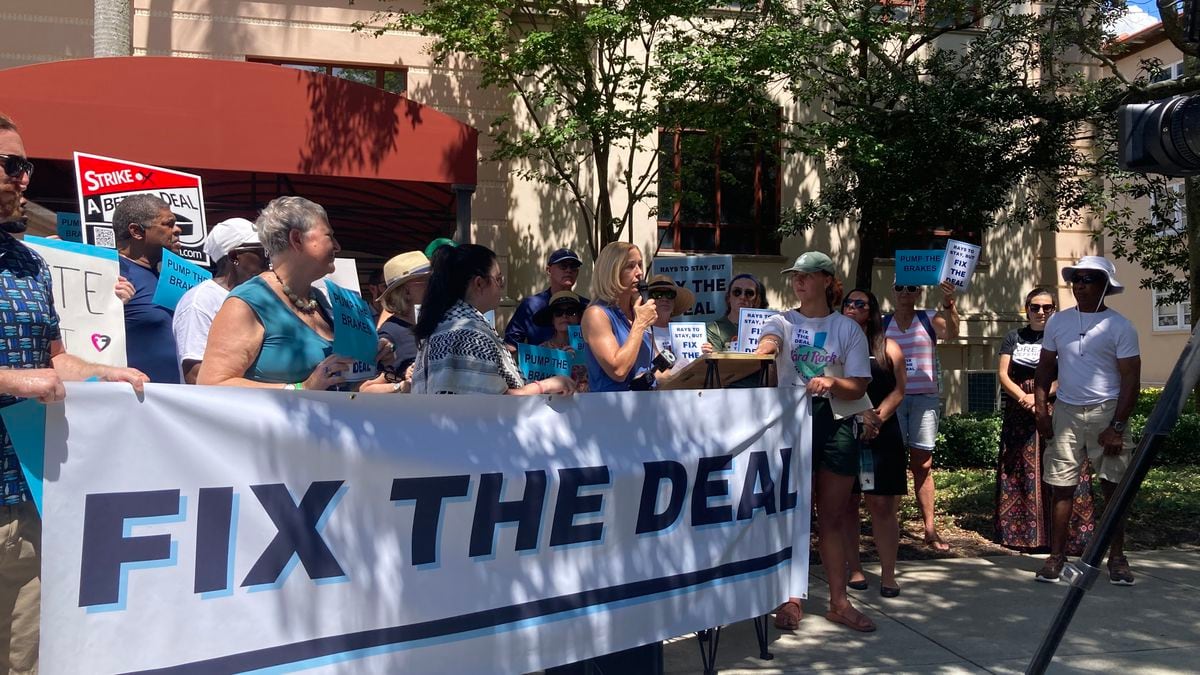St. Petersburg officials on Thursday took the first steps toward officially approving a partnership with the Tampa Bay Rays.
Council members tentatively approved a development agreement for the new stadium and future historic gas plant district, and approved zoning changes for 24 acres of the property. They also agreed to extend the life of the Intown Redevelopment Area, where the land is located.
All of these measures still require at least one additional vote before they can pass. The next round of hearings and votes is scheduled for July 11.
The decisions made — the first time council members had taken a formal vote on anything related to the proposal — served as a temperature check on officials’ stance on the broader project. All of this paves the way for formal approval of the comprehensive project, which city officials hope will happen next month.
But some council members objected to the fact that the documents had not been finalized before the vote. Members’ annual summer recess begins today and continues until early July, days before the next meeting is scheduled.
“We make decisions based on drafts, not final documents. I can’t stress that more,” Councilwoman Lysette Hanovich said. “It is our duty to do our due diligence and we can only do that appropriately with final documents and not rush the process.”
The development agreement was tentatively approved by a 5-3 vote. The regulatory document specifies the geographic area of the area, the 30-year term and other parameters of the deal — such as parking management, affordable housing promises and other requirements.
Council members Ritchie Floyd, John Muhammad and Hanewicz voted no in each case.
In a similar vein, the council approved the rezoning of seven parcels of public land — currently used for Rise parking — for mixed-use development. City workers said the change would standardize zoning for the historic gas plant district.
“It is very important for Hines to begin the permitting process,” City Manager Rob Gerdes said about why the target date was chosen. It also affects whether the city can apply for certain state funding to meet the project’s affordable housing goals.
But if the final documents are not ready in enough time, Gerdes said the meeting will be postponed.
Council members also voted to extend the life of Intown, which will allow the city to continue using tax increment financing — a tool designed to pay off projects with future tax gains on property values.
Through this process, when property values rise, some of the new tax revenue stays in the Intown area, rather than being spent elsewhere. The city relies on property values increasing 7% each year, so it can use some of that income for Rays Stadium and the Historic Gas Plant District.
St. Petersburg is scheduled to allocate $212.5 million from this revenue source to the stadium, plus an additional $130 million for infrastructure related to the redevelopment of the gas station.
Spend your days with Hayes
Subscribe to our free newsletter Stephinitely
Columnist Stephanie Hayes will share thoughts, feelings, and funny acts with you every Monday.
You’re all signed up!
Want more of our free weekly newsletters in your inbox? Let’s get started.
Explore all your options
Some residents decried the existence of the Intown District and the use of tax increment financing in the first place, believing that the money should be distributed throughout the city. Others disagreed with the money being used to pay for the stadium, rather than other public services.
“I was really excited when I was elected to do the opposite of what we are doing here today,” Councilman Floyd said. This practice “locks tons of wealth downtown.”
Currently under city policy, the district is scheduled to use tax increment financing through 2032. The council voted 5-3 Thursday to extend the arrangement through 2042 for city taxes.
Council members also raised the maximum the city can pay Faegre Drinker Biddle & Reath, the legal firm assisting in negotiations with the baseball team, to $1.5 million. This is the third time since December that the cap has been raised.
“Your attorneys are clearly devoting a lot of time to this,” Hanwitz said. “My concern from the beginning was the speed at which we were going. When I look at the bills and how they are coming up, it’s because we have lawyers working around the clock because this is being paid as quickly as possible.
Throughout the evening, residents also criticized the project’s timeline, calling the procedures hasty and lacking in transparency.
At an event immediately preceding the meeting, organizers from the Sierra Club and Faith of Florida gathered in the sunshine outside City Hall to urge officials to slow the deal.
Dan Hooper, one of the organizers of the Sierra Club, said he was more optimistic that his group’s environmental priorities could be taken into account. But he still describes the negotiations as a “runaway train.”
In a letter shared with council members before Thursday’s meeting, attorneys with the Southern Poverty Law Center warned of potential civil rights violations if the city moves forward.
“These are not secondary agreements, and in fact address important aspects of the proposed transaction,” the letter said. “We urge the city to reconsider this hasty and chaotic timeline for this decision of great public importance in light of these concerns and potential legal liabilities.”
A number of residents expressed their support for the deal, although they often described it as incomplete.
“There are as many pros and cons as we can find in this deal on either side,” said Kenneth Mack, a resident who said he was born at the historic gas plant. “I think we need to move forward. I think we have an agreement on the table that is workable.”
Times staff writer Colleen Wright contributed to this report.





